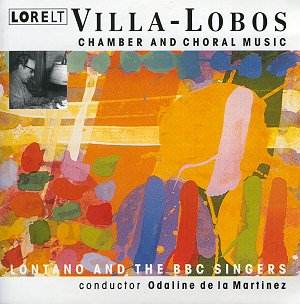Villa-Lobos is an enterprising, intriguing and entertaining
composer, and it is always worth exploring his repertoire beyond the
handful of pieces which have infiltrated the international repertory.
This enterprising and highly appealing disc confirms
all this and more. It is entitled 'Chamber and Choral Music', and this
rather odd combination is indeed what the programme contains. For example,
the Quatuor of 1921 is really no such thing, since it is scored for
the unusual combination of flute, alto saxophone, celesta, harp and
female voices. But no matter, since the sound-world (as elsewhere on
the disc) is itself full of interest, the ensemble working with the
utmost imagination as the musical ideas develop.
Villa-Lobos was always inclined to make nationalist
ideas the focus of his music, and the various Choros are further examples
of this. The Choro is 'a popular urban type of music used by street
serenaders in Rio de Janeiro'. But the composer himself was even more
specific, claiming the music as 'representing a new form of musical
composition, synthesising different kinds of Brazilian Indian and folk
music, having as their principal elements rhythm and all kinds of typical
folk melody that appear accidentally from time to time, always transformed
by the personality of the composer'. These thoughts are put to the proof
in two highly imaginative pieces featured here: the Two Choros bis of
1928, scored only for violin and cello, and the Choros No. 7 composed
four years previously.
The former employs just the violin and the cello, creating
some remarkable sonorities and rivals Ravel's famous Duo as a masterpiece
in this unlikely genre. The latter is more diversely scored, with flute,
oboe, clarinet, alto saxophone, bassoon, violin, cello and tam-tam.
And it is every inch as entertaining as that extraordinary instrumentation
would indicate; nor is it merely a series of effects. Likewise the early
Sextet (flute, oboe, saxophone, celesta, harp and guitar), from 1917,
reveals the composer's obsession with unusual sonorities and effective
combinations of instruments. In all this music Odaline de la Martinez
secures distinguished playing from her chamber ensemble, Lontano.
Probably the best known of Villa-Lobos's compositions
are the Bachianas Brasileiras, but even these pieces are not so familiar,
particularly when they exist, as does No. 9 in the series, in various
different versions. The original score of 1945 was for an 'orchestra'
of wordless voices, but the music was later rescored for strings. It
is the original version which is found here, performed with consummate
skill by the BBC Singers. In both the slow-moving, mysterious prelude
and the lively succeeding fugue, the music makes an hypnotic effect,
aided by an atmospheric recording and the helpful acoustic of St Silas
Church, Kentish Town. With helpful booklet notes to introduce this unfamiliar
music, this CD does Villa-Lobos a real service.
Terry Barfoot


